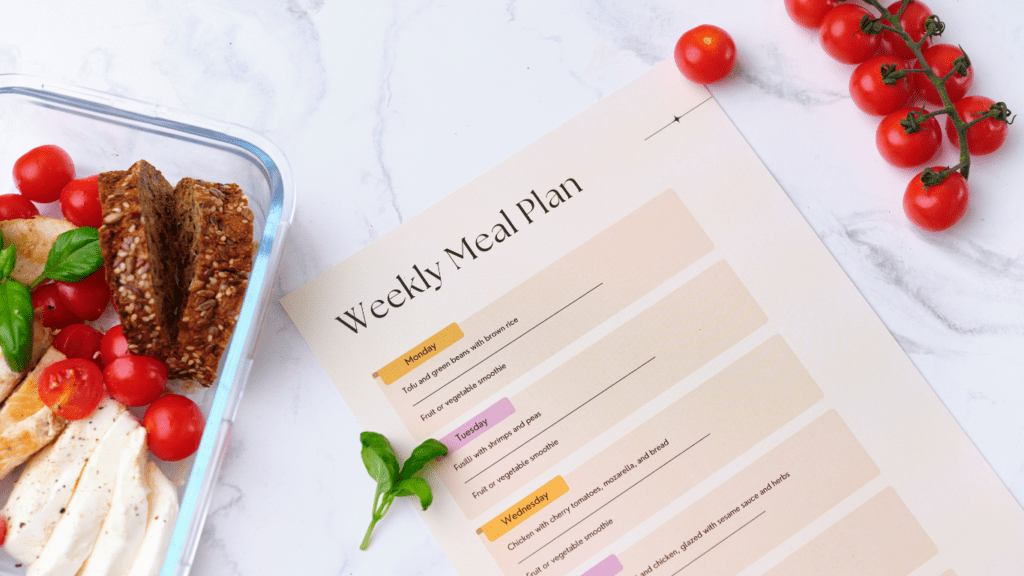The Importance of Meal Planning for Runners
Meal planning offers several advantages for runners. It optimizes energy levels, contributes to faster recovery, and reduces injury risks.
Energy and Stamina Enhancement
Meal planning boosts runners’ energy and stamina. Properly balanced meals provide the necessary carbs, proteins, and fats to fuel workouts. Consuming carbs like brown rice, oatmeal, and whole-grain bread before runs ensures sustained energy.
Including lean proteins, like chicken, fish, and tofu, aids in muscle repair. Healthy fats from sources like avocados, nuts, and olive oil support overall endurance.
Injury Prevention and Recovery
Consistent meal planning helps prevent injuries and speeds up recovery. Nutrient-rich foods, including leafy greens, berries, and high-quality proteins, strengthen muscles and connective tissues.
Omega-3 fatty acids from fish and flaxseeds reduce inflammation. Post-run meals, with a mix of carbs and proteins, promote muscle recovery and reduce soreness.
Key Nutrients for Runners
Runners depend on specific nutrients to fuel their bodies effectively and recover after intense workouts. Let’s explore the critical components of a runner’s diet.
Carbohydrates as Fuel
Carbohydrates provide the primary energy source for runners. The body converts carbs into glycogen, which muscles store and use during exercise.
Foods like whole grains, fruits, and vegetables ensure steady energy levels. High-carb meals before and after runs maximize performance and recovery.
Proteins for Muscle Repair
Protein supports muscle repair and growth. Post-run meals should include lean proteins like chicken, fish, beans, and tofu. Consuming protein within 30 minutes of finishing a run aids in muscle recovery. Aim for 1.2-1.7 grams of protein per kilogram of body weight daily.
Hydration and Electrolytes Balance
Hydration maintains optimal body function and prevents fatigue. Runners lose electrolytes through sweat, so they need sodium, potassium, and magnesium.
Drinks with electrolytes restore balance after long runs. Water remains essential, but sports drinks can provide added benefits during longer sessions.
Creating a Weekly Diet Plan
Creating a weekly diet plan tailored to running performance requires careful consideration of nutrient timing and balance. A well-structured plan sustains energy levels and aids recovery.
Sample Meal Plan Day-by-Day

A day-by-day sample meal plan ensures all nutritional needs are met. Here’s an example for optimal running performance:
-
Monday
- Breakfast: Oatmeal with berries, almonds, and honey.
- Lunch: Grilled chicken salad with mixed greens, quinoa, and avocado.
- Dinner: Salmon, sweet potatoes, and steamed broccoli.
- Snacks: Greek yogurt, banana.
-
Tuesday
- Breakfast: Whole grain toast, scrambled eggs, and spinach.
- Lunch: Turkey wrap with hummus, cucumber, and tomato.
- Dinner: Pasta with marinara sauce, lean beef, and mixed vegetables.
- Snacks: Apple slices, peanut butter.
-
Wednesday
- Breakfast: Smoothie with spinach, banana, protein powder, and chia seeds.
- Lunch: Chickpea and vegetable stir-fry.
- Dinner: Grilled tuna, quinoa, and sautéed kale.
- Snacks: Hard-boiled eggs, carrot sticks.
-
Thursday
- Breakfast: Greek yogurt with granola and mixed berries.
- Lunch: Chicken and vegetable rice bowl.
- Dinner: Turkey meatballs, whole grain pasta, and green beans.
- Snacks: Almonds, orange.
-
Friday
- Breakfast: Smoothie bowl with oats, nuts, mixed fruits.
- Lunch: Tofu salad with mixed greens, brown rice, and olive oil dressing.
- Dinner: Grilled shrimp, couscous, and asparagus.
- Snacks: Cottage cheese, berries.
-
Saturday
- Breakfast: Pancakes with banana slices and maple syrup.
- Lunch: Quinoa salad with black beans, corn, and lime dressing.
- Dinner: Baked chicken, mashed sweet potatoes, and peas.
- Snacks: Trail mix, apple.
-
Sunday
- Breakfast: Whole grain cereal with milk and fresh fruit.
- Lunch: Lentil soup with whole grain bread.
- Dinner: Pork tenderloin, brown rice, and mixed vegetables.
- Snacks: Smoothie, nuts.
Adjusting Intake Based on Training Intensity
Adjusting daily intake based on training intensity maximizes performance. Higher intensity days require increased carbohydrates and proteins.
- High-Intensity Days
- Breakfast: Add extra serving of carbohydrates (e.g., additional toast or oatmeal).
- Lunch:
Useful Tips for Effective Meal Planning
Implementing effective meal planning can significantly enhance running performance. These tips streamline the process and ensure your diet supports your training goals.
Shopping and Meal Prep Strategies
Begin meal planning with a well-organized shopping list. Outline ingredients based on your weekly meal plan, focusing on nutrient-dense foods.
Purchase items in bulk, like grains and proteins. Opt for fresh produce and lean meats.
Designate a specific day for meal prep. Cook and portion meals ahead of time, storing them in airtight containers. Prepping snacks such as nuts, yogurt, and fruit ensures quick access to healthy options.
Monitoring Progress and Adjustments
Track your dietary intake and running performance. Use a journal or an app to log meals and note any changes in energy levels, endurance, or recovery times. Review this data weekly to identify patterns.
Adjust your meal plan based on progress. Increase carbohydrate intake if experiencing fatigue during runs. Add more protein on recovery days to aid muscle repair. Regularly refining your diet ensures it remains aligned with your training needs.



